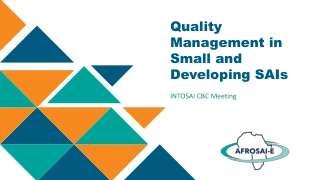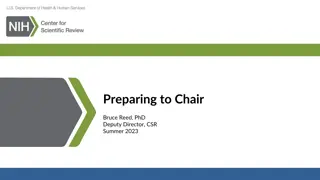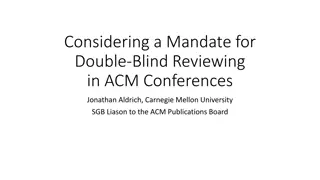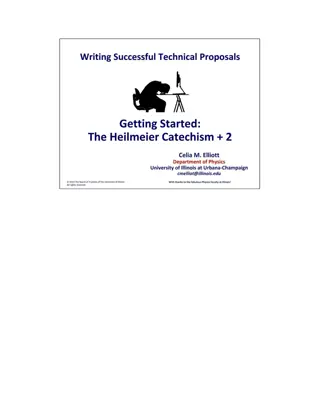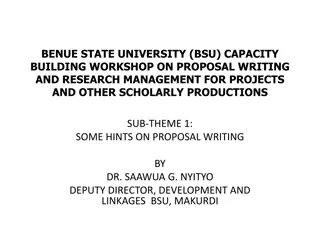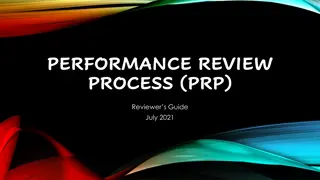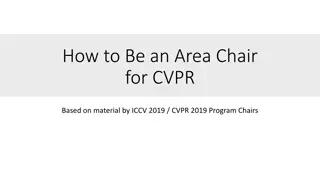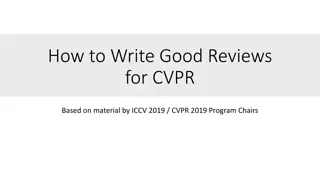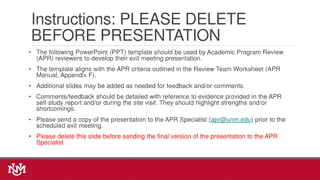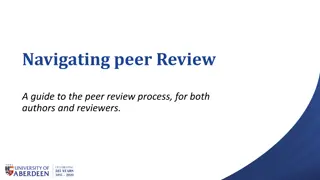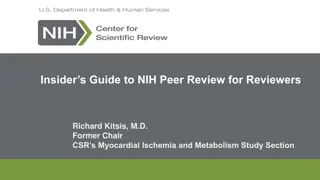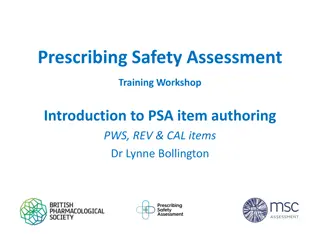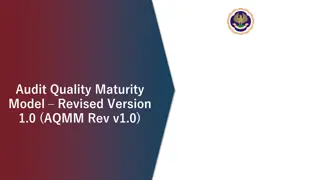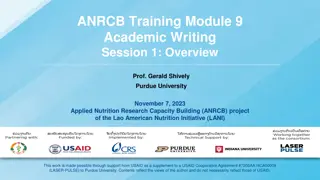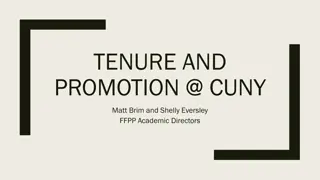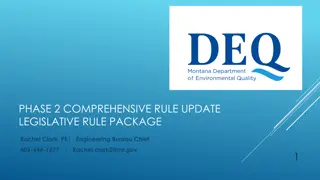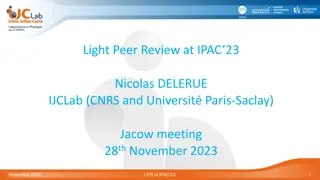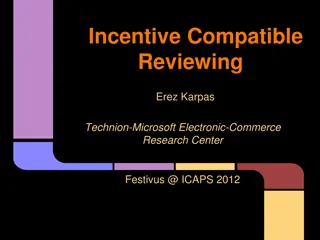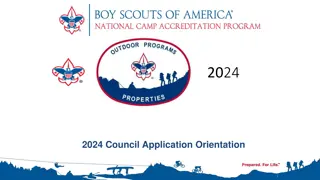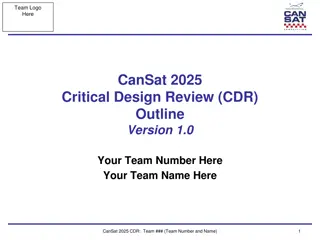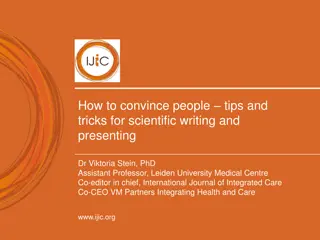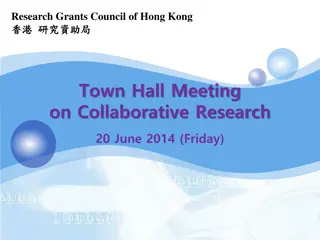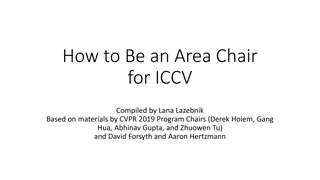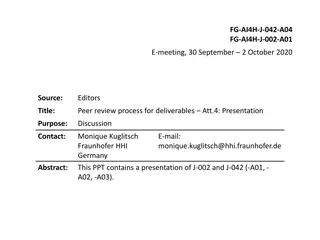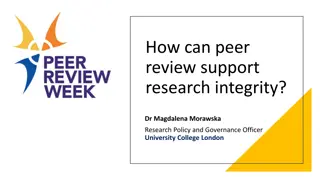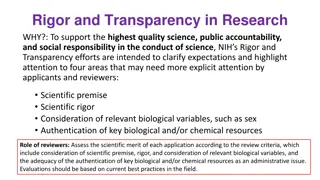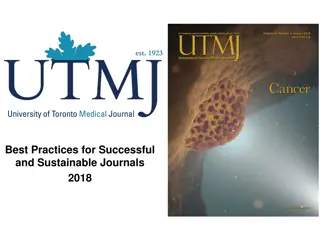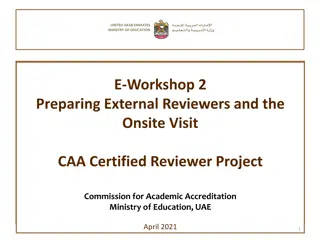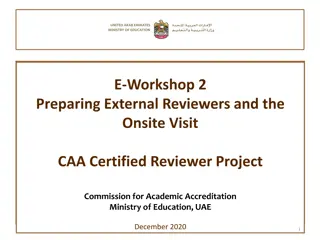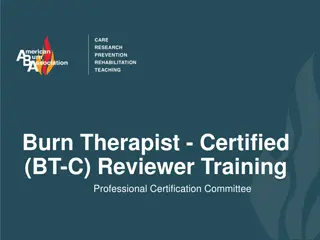Simplified Review Framework
Simplified review framework for peer review criteria in research project grants, aimed at improving the evaluation process for peer reviewers. The framework will address concerns raised by the extramural community regarding increased complexity and administrative burden in NIH's peer review criteria
1 views • 20 slides
Quality Management in Small and Developing SAIs
The challenges faced by small and developing Supreme Audit Institutions (SAIs) in managing quality, including financial constraints, staff turnover, and inadequate governance systems. Discover the successes achieved, such as certified quality assurance reviewers and increased audit coverage.
2 views • 11 slides
Strategies for Successful Research Funding Proposals
Research active academics play a crucial role in attracting external research funding, benefiting both the university and individuals. This involves building a strong team, networking, and collaboration to enhance publications and impact. Knowing funders' aims, standing out among proposals, and conv
2 views • 17 slides
Ensuring Thermal Model Integrity: Best Practices and Guidelines
Learn how to conduct effective model reviews to validate thermal models, identify errors, and enhance overall reliability. Discover the importance of independent assessments, ideal timing for reviews, key aspects to encompass, suitable reviewers, and timeframes for different model complexities.
7 views • 52 slides
Roles and Responsibilities of Study Section Chair and Meeting Participants
Understanding the distinct roles of study section chairs and meeting participants is crucial for effective research proposal evaluation. The study section chair leads discussions and implements policies, while meeting participants, including the Scientific Review Officer (SRO) and reviewers, play co
5 views • 14 slides
Enhancing Peer Review Quality Through Double-Blind Reviewing in ACM Conferences
Double-blind reviewing (DBR) is increasingly recognized for its effectiveness in reducing biases, improving article quality, and practicality in ACM conferences. Studies show evidence of gender and institutional biases in single-blind reviewing, while DBR enhances fairness and credibility. DBR revie
0 views • 9 slides
Top 12 Tricks for Mainstreaming Gender in Publications
Tricks recommended for mainstreaming gender in publications include considering gender throughout the development process, integrating gender in each section, seeking women's perspectives in research, providing gender-disaggregated data, aiming for gender balance among reviewers, involving a gender
0 views • 5 slides
Heilmeier Catechism for Successful Proposal Writing
The Heilmeier Catechism, a set of nine questions developed by George H. Heilmeier, is a vital tool for creating effective proposals. It emphasizes clear goals, hypothesis-driven research, avoiding jargon, and providing alternative plans. Incorporating the catechism in your proposal can enhance its q
0 views • 15 slides
Effective Proposal Writing: Key Strategies for Securing Funding
Proposal writing is essential in academia for securing funding. This workshop at Benue State University shed light on the importance of persuading reviewers and addressing unspoken needs of funding agencies. Key elements such as conceptual innovation, methodological rigor, and rich substantive conte
1 views • 21 slides
Performance Review Process (PRP) Guide for Reviewers - Overview and Tips
This guide aims to assist line managers and reviewers in preparing for performance review meetings. It covers the objectives of the CRGPA performance review process, key stages in the process, discussion areas, top tips for planning, and an overview of the performance review process. Emphasizing on
1 views • 26 slides
NSF Graduate Research Fellowship - Application and Review Process
The NSF Graduate Research Fellowship program offers financial support for US citizens, nationals, or permanent residents pursuing graduate studies. Applicants must adhere to specific guidelines for eligibility and submission, including personal statements, research plans, recommendation letters, and
1 views • 4 slides
Guidelines for Being a CVPR Area Chair Based on ICCV 2019 & CVPR 2019
Serving as an Area Chair for CVPR involves making transparent decisions for the community, ensuring consistency, and handling critical paper evaluations. The decision process includes assigning papers to reviewers, managing reviews, discussions, rebuttals, and final decisions. Area Chairs play a cru
1 views • 17 slides
Guidance on Writing Effective Reviews for CVPR - Insights from ICCV 2019 & CVPR 2019 Program Chairs
Providing quality reviews is crucial for the success of CVPR. Helpful reviews assist area chairs in making informed decisions, aid authors in receiving constructive feedback, and benefit the community by ensuring valuable papers are accepted. Conversely, poorly written reviews can have negative cons
0 views • 19 slides
Academic Program Review Exit Meeting Presentation Template
This PowerPoint template is designed for Academic Program Review (APR) reviewers to prepare their exit meeting presentations. It includes sections for overall program strengths, criteria evaluation, and findings on strengths and shortcomings. Reviewers can customize the template by adding additional
0 views • 13 slides
Navigating Peer Review: A Comprehensive Guide for Authors and Reviewers
In academic publishing, peer review plays a crucial role in maintaining publication quality. This guide offers a detailed overview of the peer review process for both authors and reviewers, covering topics such as receiving review invitations, manuscript submission, writing effective reviews, and mo
0 views • 31 slides
Insider's Guide to NIH Peer Review for Reviewers by Richard Kitsis, M.D.
This insider's guide provides valuable insights for reviewers participating in NIH grant application peer reviews. It covers essential aspects such as staying grounded, getting started, writing reviews effectively, scoring applications, participating in meetings, and enjoying the overall experience.
0 views • 12 slides
Prescribing Safety Assessment - Item Development Process Overview
In the Prescribing Safety Assessment Workshop, item authoring is a crucial process involving multiple stages such as new item creation, editing, peer review, and final assessment board approval. Copy editors and clinical reviewers ensure the accuracy and quality of item content, while peer reviewers
0 views • 32 slides
Audit Quality Maturity Model (AQMM) - Overview and Implementation Guidelines
The Audit Quality Maturity Model (AQMM) is a self-evaluation tool designed for audit firms to assess their level of maturity, identify strengths and weaknesses, and enhance their audit practices. The model covers various operational aspects such as revenue budgeting, technology adoption, and human r
1 views • 14 slides
Understanding Academic Journals: Ownership, Operations, and Processes
Explore the inner workings of academic journals, including ownership by the academic community, key operational structures, and the review process timeline. Gain insights into reputable vs. predatory publishers, implications of ownership, and the roles of editors, reviewers, and policy boards.
0 views • 17 slides
Guidelines for Tenure and Promotion Process at CUNY
Comprehensive guidelines for the tenure and promotion process at CUNY, including expectations for scholarly publications, external reviews, dossier components, and strategic planning. Learn about the key stages, involvement of academic directors, external reviewers, and decision-making entities to n
0 views • 15 slides
Phase 2 Comprehensive Rule Update Legislative Rule Package Overview
Seven subdivision bills were adopted during the 2023 session, covering various topics such as independent reviewers, cut and fill systems, connection to public sewer systems, and more. The public comment period and hearing are scheduled, with the draft rule to respond to comments by August 25. A bil
3 views • 17 slides
Light Peer Review at IPAC'23 Organized by IN2P3: Details and Guidelines
Light Peer Review (LPR) at IPAC'23 organized by IN2P3 aims to enhance the academic reputation of accelerator research, train students in peer-review processes, and elevate the impact factor of publications. The event has strict acceptance criteria ensuring the quality and originality of the work, wi
0 views • 22 slides
Efficient Tips for Reviewing Faculty and Professional Staff in Educational Institutions
Enhance your reviewing skills by preparing thoroughly before site visits, maintaining confidentiality, and working collaboratively as part of an Education Review Team (ERT). Focus on unbiased assessment, meticulous document examination, and effective communication with fellow reviewers and instituti
0 views • 14 slides
Strategies for Effective Paper Reviewing in Academic Circles
In the world of paper reviewing, the importance of incentivizing good reviews is explored through game theory models. The goal is to ensure quality papers are accepted and bad ones are rejected. Strategies like rewarding good reviewers and proposing innovative incentives like free beers are discusse
0 views • 8 slides
NCAP Accreditation Process Overview
Manage the NCAP 5-year authorization process for councils, oversee trained reviewers, ensure documents meet national standards, and issue 5-year authorizations. Follow up with councils, communicate status, and escalate issues to the coordinator. National NCAP coordinator manages the process and revi
0 views • 35 slides
CanSat 2025 Critical Design Review (CDR) Presentation Outline
This outline provides a structured plan for the CanSat 2025 Critical Design Review (CDR) presentation, including sections on team organization, mission summary, system overview, and more. The presentation format, guidelines, and presenter information are also detailed. The content emphasizes the imp
0 views • 95 slides
Mastering the Art of Convincing: Scientific Writing and Presentation Insights
Delve into the world of scientific writing and presenting with expert tips from Dr. Viktoria Stein, covering the reviewing process, key considerations for articles, and strategies to increase your chances of publication. Learn how to engage reviewers, craft impactful content, and navigate the publis
0 views • 26 slides
Research Grants Council of Hong Kong Collaborative Research Procedures
Research Grants Council of Hong Kong facilitates collaborative research through a structured process involving preliminary proposals, full proposals, cross-disciplinary projects, and strategic considerations for funding decisions. The council evaluates proposals through multiple stages, involving re
1 views • 8 slides
Understanding Peer Review in Manuscript Submission Process
Peer review plays a crucial role in the manuscript submission process, ensuring the quality and validity of scientific research. Reviewers look for various aspects such as hypothesis relevance, experimental design, methodology, data analysis, and conclusions. Responding to reviewer comments and revi
0 views • 27 slides
Guide on Being an Area Chair for ICCV
Guided by insights from previous Program Chairs, this compiled resource by Lana Lazebnik offers a comprehensive overview of the roles and responsibilities associated with being an Area Chair for ICCV. It outlines the guiding principles, decision-making processes, and detailed duties involved in ensu
0 views • 17 slides
The Art of Reviewing: From Opinions to Epigrams
Exploring the art of reviewing, this content delves into how individuals share opinions on plays, concerts, games, and art. It highlights the power of wit in reviews, showcasing famous reviewers known for their clever epigrams. The significance of epigrams, aphorisms, and clichés in persuasion is a
0 views • 26 slides
Peer Review Process for Deliverables in FG-AI4H
Presentation by Monique Kuglitsch from Fraunhofer HHI discussing the peer review process for deliverables in FG-AI4H. The presentation covers the importance of peer review, the workflow, finding reviewers, components of a review, and provides a checklist for peer reviewing TDD. Additionally, a white
0 views • 4 slides
Enhancing Research Integrity Through Peer Review: Best Practices and Principles
Peer review plays a crucial role in supporting research integrity by upholding principles like honesty, rigor, care, respect, and accountability. Responding to reviewers and being a reviewer both require the application of these integrity principles to ensure high-quality, trustworthy research outco
0 views • 6 slides
Tactile Graphics in Education and Careers Symposium
This symposium explores the innovative use of tactile graphics in education and careers, showcasing advanced tools like the Graphiti system. The featured physical unit offers a versatile layout with various connectivity options, coupled with enhanced functionality for viewing and editing graphics. P
0 views • 10 slides
Enhancing Research Quality through Rigor and Transparency Initiatives
NIH's Rigor and Transparency efforts aim to uphold the highest standards in research, ensuring scientific premise, rigor, consideration of relevant biological variables, and authentication of key resources. Reviewers play a critical role in assessing these aspects to support robust and accountable s
0 views • 9 slides
Insights into Editorial Responsibilities and Avoiding Desk Rejection in Academic Publishing
Editors play a crucial role in setting the tone of academic discourse, enforcing ethical standards, and advancing technical standards in publishing. Avoiding desk rejection in academic publishing can significantly impact the acceptance of a paper, with an emphasis on the importance of writing qualit
0 views • 32 slides
University of Toronto Medical Journal - Best Practices for Sustainable Journals
The University of Toronto Medical Journal, established in 1923, follows best practices for successful and sustainable publishing. The journal, run by students, offers open access to general scientific content, including original research, review articles, and more. The editorial process involves fac
0 views • 14 slides
Enhancing Academic Accreditation Process: Onsite Visit and Self-Study Analysis
The e-workshop sessions focus on preparing external reviewers, analyzing self-study documents, and understanding the purpose of onsite visits in academic accreditation. Topics covered include self-study definition, evaluating weaknesses identified by reviewers, and the importance of the onsite visit
0 views • 16 slides
E-Workshop on Preparing External Reviewers and Onsite Visit for Academic Accreditation
This e-workshop held by the Ministry of Education in the UAE focused on preparing external reviewers and institutions for onsite visits related to academic accreditation. It covered the importance of analyzing the self-study, identified common weaknesses in self-studies, and highlighted the purpose
0 views • 16 slides
Burn Therapist Certified (BT-C) Reviewer Training Program
The Burn Therapist Certified (BT-C) Reviewer Training Program aims to promote and recognize occupational and physical therapists specializing in burn rehabilitation. Reviewers are selected based on specific criteria and are required to undergo training and complete mock reviews before evaluating por
0 views • 35 slides

